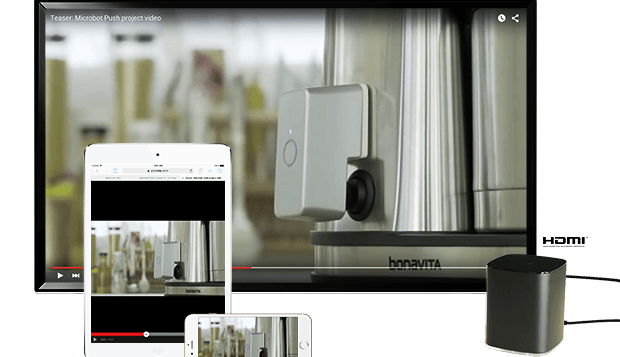Microbot Push flips the switch
November 09, 2015
on
on

A WiFi enabled smart socket is a good solution if you need to remotely control a household appliance from a smartphone of WiFi-capable controller. The Microbot Push device offers similar functionality but is a self-contained Bluetooth-connected actuator. That means you just position it over the switch (with double sided tape) on the appliance you want to control. When you switch the actuator a push rod extends 10mm with a force of 1.6 kg to flip the switch (in most cases you’ll need another actuator to flip it back).
This must be the fastest way to smart up to any of your existing dumb appliances; you don’t even need to pull the plug! Each of the Microbot Push actuators measure 27 x 62.5 x 32 mm, a rechargeable battery lasts about 6 months when the Push is used for one minute every day. Communication to the Push actuator is via Bluetooth and a capacitive touch button allows manual override.
A Prota box can be added to expand the system and provide 802.11b/g/n WiFi connectivity. Many Push actuators can now be linked together and their actions logically interlinked together with existing smart devices. The Prota hub houses an ARMv7 1.5 GHz quad-core processor with up to 1 GB RAM, 8 GB built-in flash storage and runs the company's proprietary Prota OS called Agatha. The system is currently up for funding on Indiegogo.
This must be the fastest way to smart up to any of your existing dumb appliances; you don’t even need to pull the plug! Each of the Microbot Push actuators measure 27 x 62.5 x 32 mm, a rechargeable battery lasts about 6 months when the Push is used for one minute every day. Communication to the Push actuator is via Bluetooth and a capacitive touch button allows manual override.
A Prota box can be added to expand the system and provide 802.11b/g/n WiFi connectivity. Many Push actuators can now be linked together and their actions logically interlinked together with existing smart devices. The Prota hub houses an ARMv7 1.5 GHz quad-core processor with up to 1 GB RAM, 8 GB built-in flash storage and runs the company's proprietary Prota OS called Agatha. The system is currently up for funding on Indiegogo.
Read full article
Hide full article



Discussion (0 comments)